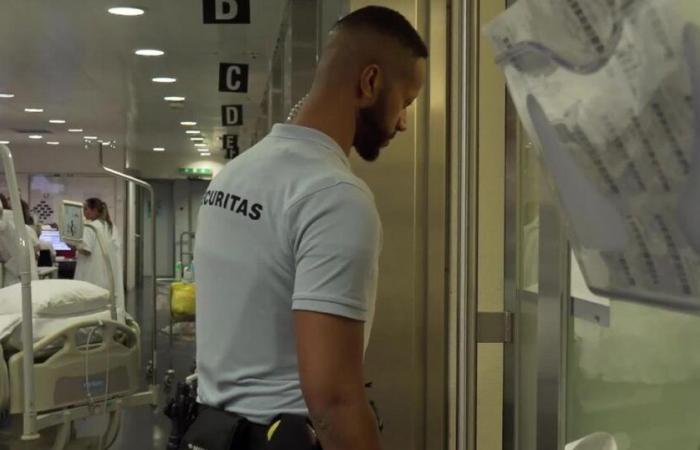Insults, threats, but sometimes also physical attacks: CHUV emergencies are experiencing an increase in violence. To deal with this, the Vaudois establishment has been working for several years with security agents to defuse difficult situations.
Every year, nearly 70,000 patients go to the CHUV emergency room. Of this number, almost 400 were violent in 2024. This is an increase of 24% compared to 2022. This increase is explained in particular by a change in CHUV policy towards violence.
“In the past, we had a tendency to excuse situations of violence, or even to keep quiet about them,” explains Pierre Merminod, deputy head of security at CHUV, in the program Mise au Point. From now on, the establishment applies zero tolerance for cases of violence against its staff. Each case is referenced and entered into the statistics.
Drama, news items, social misery, violence: it all ends at the CHUV. And you have to be psychologically well equipped to face it
For several years, CHUV nursing staff have been supported when necessary by a permanent service of security agents. There are around fifty of them, specially trained to interact with patients. Their role is to eliminate any risk of violence that the patient could inflict on himself or others and to restore calm before starting the medical process.
“The CHUV emergencies concentrate all of society’s ills,” says Kaled, a security officer at the CHUV for a year. “Dramas, news items, social poverty, violence: all of this ends at the CHUV. And you have to be psychologically well equipped to deal with it,” he adds.
>> Read also: Violence against the medical profession is increasing in Switzerland
Training workshops
The CHUV has also implemented training for its staff. This includes theoretical courses on violence, verbal de-escalation and post-crisis management, as well as role-playing games to have the right words and reflexes during tense situations. Over the past three years, more than 250 employees have already taken part.
Nursing staff are, for example, invited to find a ready-to-use sentence, says the assistant director of the CHUV Training Center, Muriel Gasser. “It’s sometimes something very simple, such as ‘I remind you that we are in a hospital and I need respect to do my job’”, illustrates the former nurse.
This is also the whole challenge for the security agent in a hospital environment. You have to know how to juggle between empathy and firmness
“It’s not aggressive, but we still reported to patients or relatives that we heard an insult and that it is not acceptable,” she continues.
-Verbal de-escalation
In the CHUV emergency rooms, two thirds of the violence experienced is verbal and a third is physical violence, including 1% with weapons. In 2024, there will be four cases. Alcohol or drug abuse can sometimes be at the origin of this violence, but it can also be people venting their frustrations or presenting psychological disorders.
Often, the simple presence of a security guard can be enough to calm the situation. They are firm, but rely above all on verbal de-escalation. “This is also the whole challenge for the security agent in a hospital environment. You have to know how to juggle between empathy and firmness,” explains Kaled.
Sometimes, words are not enough to defuse the situation. The police may even have to intervene. Furthermore, when a patient is too agitated for the unit in which he is hospitalized, he is brought to the emergency room to be sedated and to initiate treatment.
The world has changed. You don’t put someone in a cell to calm them down.”
“There is no longer any structure other than somatic emergencies which are equipped to deal with agitation and violence,” underlines Adam-Scott Feiner, senior doctor in the CHUV emergency department. Despite his 20 years in the profession, serious cases are always painful for him.
“I didn’t study medicine to tie up and inject people,” he laments. “It’s something that is extremely violent. You have to take it upon yourself.”
Change of mentality
If violent situations are on the rise, it is also because the authorities are more likely to bring agitated people to the emergency room, which reflects a change in mentality, according to Adam-Scott Feiner. “The world has changed. You don’t put someone in a cell to calm them down,” he says.
“The police are much more sensitive to the concept of suffering of individuals,” continues the doctor. “If a patient starts to harm himself or if he is threatening, they will perhaps say that he is in pain and that he needs care. And that is rather a good thing” .
TV subject: Michael Borgognon
Web adaptation: Emilie Délétroz






